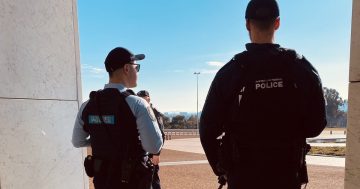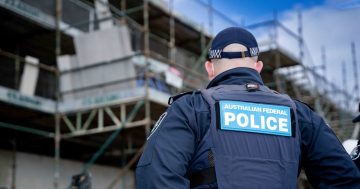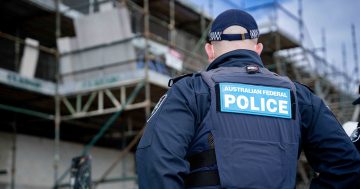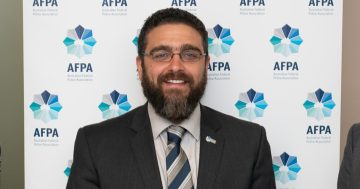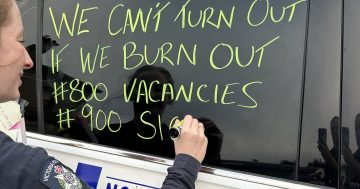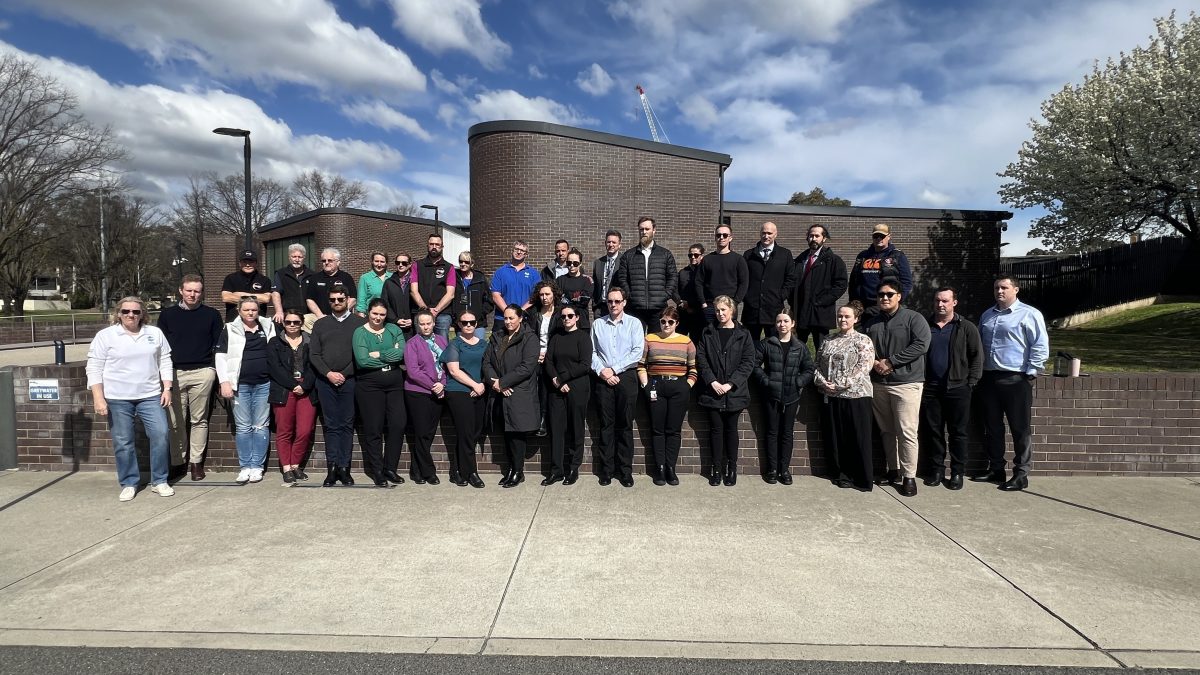
A mix of sworn and unsworn officers walked off the job for two hours at various locations, including the AFP Headquarters in Barton and the Belconnen Police Station. Photo: James Day.
Australian Federal Police (AFP) officers around the country walked off the job today (28 August), demanding the Commonwealth properly recognise the “outsized risk” of their work through a 20 per cent pay rise plus allowances.
AFP officers are the lowest-paid police force in the country, which the Australian Federal Police Association (AFPA) says is “unacceptable”.
Over the last few months, the union has been negotiating a new enterprise agreement with AFP hierarchy and the Federal Government. Members of the AFPA rejected their previous offer in June, as they believe federal police officers deserve more than the 11.2 per cent pay rise over three years being given to the rest of the Australian Public Service (APS).
It was this and a growing staff retention crisis in the ACT that forced the union to file its protected industrial action (PIA) with the Fair Work Commission (FWC).
AFPA President Alex Caruana said the deal being presented by Attorney-General Mark Dreyfus was designed for “desk job Commonwealth public servants who get work-from-home entitlements – it just won’t fly with fed-up police officers”.
“This deal is toxic,” Mr Caruana said.
“Our members can’t investigate international paedophile syndicates from home and they can’t take a bullet for the PM from home.
“We surveyed our members and 6 per cent said they would leave the AFP immediately if the current deal was enforced, while another 68 per cent said they’d start actively looking for other jobs.
“The AFP Association is prepared to fight hard for a better deal – not just because our members deserve it, but because the Australian public needs an effective federal police service.”
The FWC has placed several restrictions on the AFPA’s industrial action due to the implications for community safety that may arise.
According to the union’s government relations manager, Troy Rogers, they must gain approval from the FWC before undertaking any kind of action like a strike or work stoppage. The current AFP officer said the Commission only agreed to the walk-off after the AFPA ceded its ability to notify media about any actions during negotiations.
Mr Caruana claims this is why the union was unable to draw media attention yesterday (27 August) when AFP officers walked off the job in airports around the country.
“AFP officers will not take any industrial action that will put anyone in danger, but we are prepared to be disruptive in our fight for a reasonable deal. Today’s walkout is just another warning shot.”
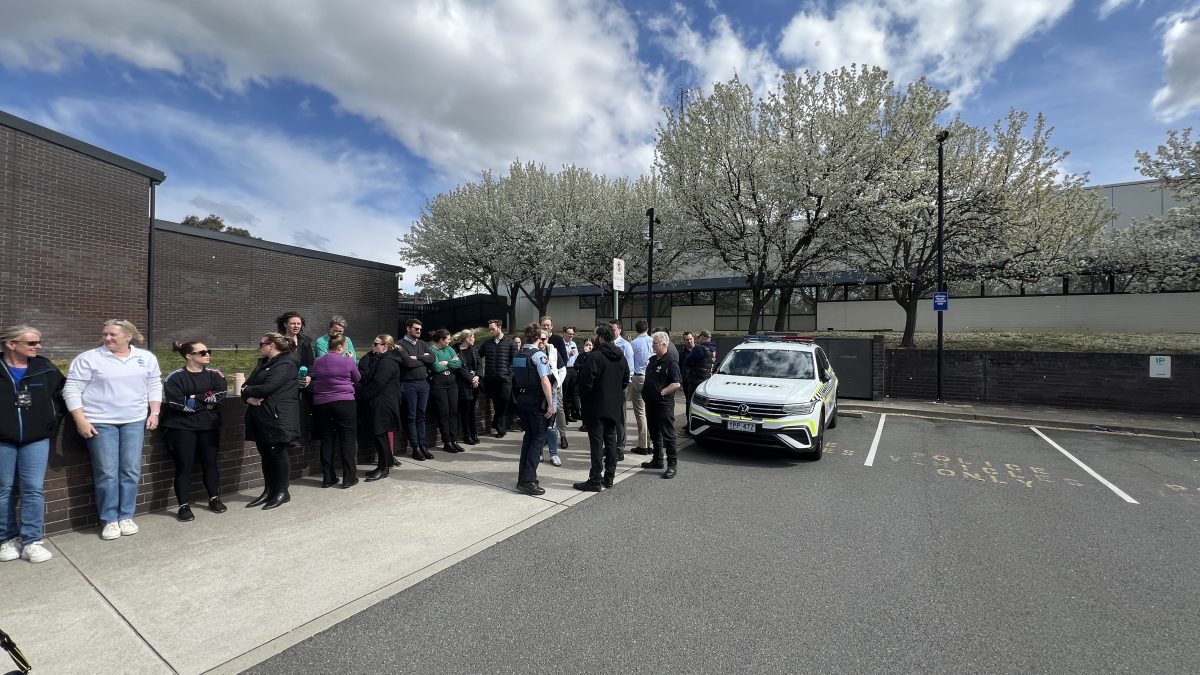
Troy Rogers, who has been at the AFP since 1999, said his colleagues were nervous and anxious during the walk-off as, for many of them, it was the first industrial action they had ever participated in. Photo: James Day.
Belco Party candidate for Yerrabi, Jason Taylor, joined the industrial action as a former detective sergeant who worked in the AFP for 14 years.
He was a union member during his time at the federal police agency, but said, “the AFPA never ever went down the path of threatening protected industrial action (PIA), let alone lodge the PIA with the FWC, let alone follow through on a work walk out”.
“I think that outsized risk in the nature of their work is mainly what merits them getting recognised differently to the public service,” Mr Taylor said.
“Public servants aren’t out there getting spat on or having to tell people their loved ones have died. They also have the unique issue of competing with the AFP nationally in retaining their staff.
“A very experienced police officer like a detective senior constable is a very pricey commodity for the AFP. So the ease at which that officer can move across to the broader AFP is easier than trying to attract one from NSW.”
The former detective sergeant said because there’s already an inexperienced workforce in the ACT, it will take much more than recruiting new people to fix the ongoing issue of staff retention.
Mr Roberts said the AFPA is still bargaining with the Federal Government and federal police hierarchy, an ongoing process he expects to continue for a while longer.
“A total package around 20 per cent would be great, but we’ve got to be realistic as well. If we landed around 16 per cent with boosted allowances, that’s what the members want to see.”
He said “AFPA members have been really, really good” in supporting the union’s efforts during negotiations, with today’s participants sacrificing their own pay to be there.
“Being a cop, it’s really hard to do stuff like this. Your natural instinct is to run towards danger, not walk out, so it takes a lot of courage for these guys to actually walk out of the workplace.”
Original Article published by James Day on Riotact.




